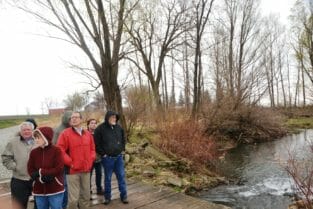Make an Impact: Participate in Your Soil and Water Conservation District
If you’ve been tuned-in to any news outlet for even a brief period of time recently, chances are strong that you’ve heard a lot about two issues: the elections, and Iowa’s water quality. And if these two issues have left you frustrated and wondering how to get involved and make a difference, consider becoming a Soil and Water Conservation District commissioner.
There are 100 SWCDs in Iowa, one for each county with two in Pottawattamie. Each district is made up of five commissioners who are elected to four-year terms, with no two commissioners from the same township within their district. The board of commissioners is tasked with guiding soil and water conservation programs in the county by developing conservation plans to help allocate funding and promote conservation practices. Commissioners are volunteers who commit to meeting once a month.
Currently, 45 PFI members are serving as commissioners or assistant commissioners, representing 33 of the 100 conservation districts in Iowa. Learn more about what it’s like to be a commissioner in this brochure, this blog post, in the spring 2016 issue of The Practical Farmer, or in the infographic below.
First, hear what PFI members have to say about being a commissioner:
What:
“It’s educational, it’s diplomatic, its compromise, and its commitment. Being a soil commissioner puts you into a position to discuss farm issues, promote sustainable farming and build understanding between the conventional, conservation and organic communities.” – Jack Knight, Allamakee County
“It’s really an activist group that has a long heritage of being involved in soil and water conservation. The state is much better off because of it.” – Mark Tjelmeland, Story County
“The Soil and Water Conservation Districts facilitate resources and tools for the practical farmer to improve soil health and water quality.” – Selden Spencer, Story County
Why:
 “To become a soil and water conservation district commissioner in Iowa is to become a guardian of our most important resources – our soils and our water – for the sake of our state and the rest of the world that depends on their continued productivity.” – Clare Lindahl, Conservation Districts of Iowa
“To become a soil and water conservation district commissioner in Iowa is to become a guardian of our most important resources – our soils and our water – for the sake of our state and the rest of the world that depends on their continued productivity.” – Clare Lindahl, Conservation Districts of Iowa
 “I’ve enjoyed serving. I enjoy those casual conversations with other farmers. When I see a farmer doing conservation measures on their farm, I like to show my appreciation, lend interest and show support. A lot of farmers don’t get the recognition they deserve. I enjoy helping those farmers get the recognition they deserve.” – Mark Tjelmeland, Story County
“I’ve enjoyed serving. I enjoy those casual conversations with other farmers. When I see a farmer doing conservation measures on their farm, I like to show my appreciation, lend interest and show support. A lot of farmers don’t get the recognition they deserve. I enjoy helping those farmers get the recognition they deserve.” – Mark Tjelmeland, Story County
 “I know there are a lot of good and knowledgeable people out there that would make great commissioners, and we need them. Those interested in being a commissioner shouldn’t come to the table with an agenda. We work together to support all farmers, big and small, in the county.” – Rick Juchems, Bremer County
“I know there are a lot of good and knowledgeable people out there that would make great commissioners, and we need them. Those interested in being a commissioner shouldn’t come to the table with an agenda. We work together to support all farmers, big and small, in the county.” – Rick Juchems, Bremer County

“I stay in it because it’s very interesting to me. Policy and people are interesting. It’s opened a lot of doors for me to learn more about environmental protection.” – Laura Krouse, Linn County

“If you like to talk farming, it’s a good board to be on.” – Jack Knight, Allamakee County
How:
“It’s important to understand what you’re getting into. We’ve had people run without attending a meeting before. Attend a couple meetings, get to know the group and know if this is the best use of your time and conservation efforts.” – Mark Tjelmeland, Story County
“The best commissioners are those who are willing to step up and participate. By calls, visits, observations. Step up and be educators to the public, to landowners, policy makers and farmers. Also be reasonable and open minded.” – Laura Krouse, Linn County
Click here to view a full-size PDF.
If you’re interested in serving as a commissioner or assistant commissioner in your county, contact your local SWCD office, and consider attending a monthly meeting.
And please let me know, so I can help with the process and also connect you to other PFI members serving as commissioners: steve@practicalfarmers.org.

